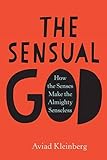The sensual God : how the senses make the almighty senseless / Aviad Kleinberg.
Material type: TextPublisher: New York : Columbia University Press, 2016Description: 1 online resourceContent type:
TextPublisher: New York : Columbia University Press, 2016Description: 1 online resourceContent type: - 9780231540247
- 0231540248
- 211 23
- BL473 .K54 2016
- online - EBSCO
| Item type | Current library | Call number | URL | Status | Notes | Barcode | |
|---|---|---|---|---|---|---|---|
 eBook
eBook
|
Biblioteca "Angelicum" Pont. Univ. S.Tommaso d'Aquino Nuvola online | online - EBSCO (Browse shelf(Opens below)) | Online access | Not for loan (Accesso limitato) | Accesso per gli utenti autorizzati / Access for authorized users | (ebsco)1044285 |
Browsing Biblioteca "Angelicum" Pont. Univ. S.Tommaso d'Aquino shelves, Shelving location: Nuvola online Close shelf browser (Hides shelf browser)
Previously issued in print: 2015.
Includes bibliographical references and index.
In the Old Testament, God wrestles with a man. In the Talmud, God wriggles his toes to make thunder and takes human form to shave the king of Assyria. In the New Testament, God is made of flesh and dwells among humans. For religious thinkers trained in Greek philosophy and its deep distaste for matter, sacred scripture can be distressing. A philosophically respectable God should be untainted by sensuality, yet the God of sacred texts is often sensual. Setting experts' minds at ease was neither easy nor simple, and, quite often, faith and logic were stretched to their limits. Focusing on examples from both Christian and Jewish sources, from the Bible to the Late Middle Ages, Kleinberg examines the way Christian and Jewish philosophers, exegetes, and theologians attempted to reconcile Gods supposed ineffability with numerous biblical and post-biblical accounts.
Online resource; title from home page (viewed on April 18, 2016).
Table of Contents; Acknowledgments; Introduction; 1. Instability and Its Discontents; 2. Loving God Like a Cow; 3. Endless; 4. Credo; 5. Unimaginable: A Short Digression; 6. Impossible; 7. A Short Discourse on the Spiritual Senses; 8. Invisible; 9. Tasteless; 10. Untouchable; 11. Inaudible; 12. Scentless; Post Scriptum; Notes; Bibliography; Index.









